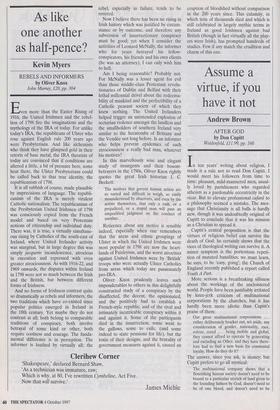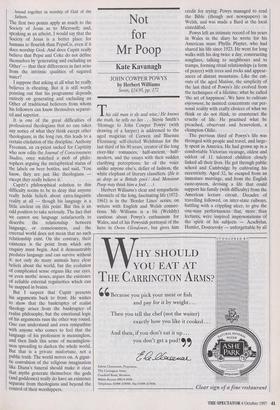Assume a virtue, if you have it not
Andrew Brown
In ten years' writing about religion, I made it a rule not to read Don Cupitt. I would meet his followers from time to time: pleasant, mild-mannered men, usual- ly loved by parishioners who regarded atheism as a pardonable eccentricity in the vicar. But to elevate professional cafard to a philosophy seemed a mistake. The mes- sage that Christianity is all balls is hardly new, though it was undoubtedly original of Cupitt to conclude that it was his mission as a Christian to spread it.
Cupitt's central proposition is that the virtues of religious belief can survive the death of God; he certainly shows that the vices of theological writing can survive it. A minor symptom is the portentous repeti- tion of mutated banalities: we must learn, he says, to be 'easy, going'; the Church of England recently published a report called Youth A Part.
More serious is a breathtaking silliness about the workings of the uncloistered world. People have been justifiably irritated by knee-jerk criticism of multinational corporations by the churches, but it has hardly been more idiotic than Cupitt's praise of them: Our great multinational corporations .. . rather deliberately bracket out, set aside, any consideration of gender, nationality, race, colour, creed . . . being mobile and global, they cannot afford to operate by generating and excluding an Other, and they have there- fore had to find a new basis for communal loyalty. How do they do it?
The answer, since you ask, is money; but Cupitt prefers to go all mystical:
The multinational company shows that a flourishing human society doesn't need to be bound to a particular stretch of land given to the founding fathers by God, doesn't need to be of one blood, and doesn't need to be bound together in worship of God of the fathers.
The first two points apply as much to the Society of Jesus as to Microsoft; and, speaking as an atheist, I would say that the Society of Jesus is a better place for humans to flourish than PepsiCo, even if it does worship God. And does Cupitt really believe that Pepsi and Coke do not define themselves by 'generating and excluding an Other' — that their differences in fact arise from the intrinsic qualities of sugared water?
I suppose that asking at all what he really believes is cheating. But it is still worth pointing out that his programme depends entirely on generating and excluding an Other of traditional believers from whom his followers can know themselves separat- ed and superior.
It is one of the great difficulties of professional theologians that no one takes any notice of what they think except other theologians; in the long run, this leads to a certain etiolation of the discipline. Anthony Freeman, an ex-priest sacked for Cupittity who now edits the Journal of Consciousness Studies, once watched a mob of philo- sophers arguing the metaphysical status of the labels on beer bottles, and said, 'You know, they are just like theologians — except they really believe it.'
Cupitt's philosophical solution to this difficulty seems to be to deny that anyone really holds beliefs about extra-linguistic reality at all — though his language is a little unclear on this point. But this is an odd position to take seriously. The fact that we cannot use language satisfactorily to describe the relationship between language, or consciousness, and the external world does not mean that no such relationship exist. On the contrary, their existence is the point from which any enquiry must begin. And it demonstrably predates language and can survive without it: not only do many animals have clear beliefs about the world, but the evolution of complicated sense organs like our eyes, or even moths' noses, argues the existence of reliable external regularities which can be mapped in brains.
But I suspect that Cupitt presents his arguments back to front. He wishes to show that the bankruptcy of realist theology arises from the bankruptcy of realist philosophy, but the emotional logic of his arguments runs the other way round. One can understand and even sympathise with anyone who comes to feel that the language of his profession is meaningless, and then finds this sense of meaningless- ness spreading to darken the whole world. But that is a private misfortune, not a public truth. The world moves on. A gigan- tic convulsion of the religious imagination like Diana's funeral should make it clear that myths generate themselves: the gods (and goddesses) really do have an existence separate from theologians and beyond the control of their worshippers.











































































 Previous page
Previous page